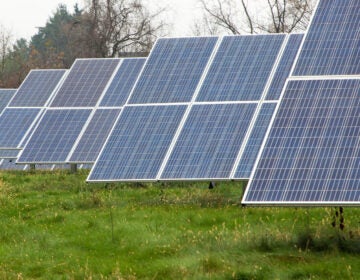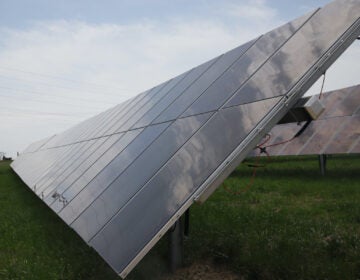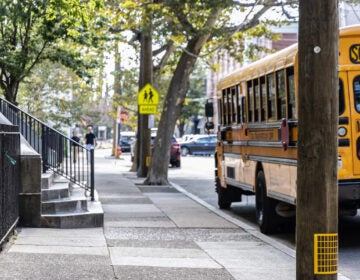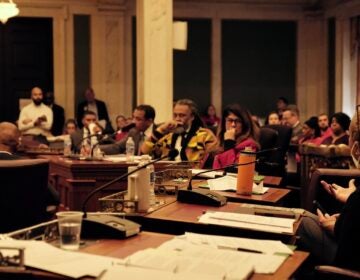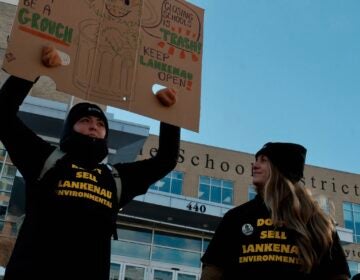Pennsylvania schools still pursuing solar projects despite federal tax credit rollbacks
None of the schools that received Solar for Schools grants have told the state they’re pulling out due to federal tax credit rollbacks.
Listen 1:23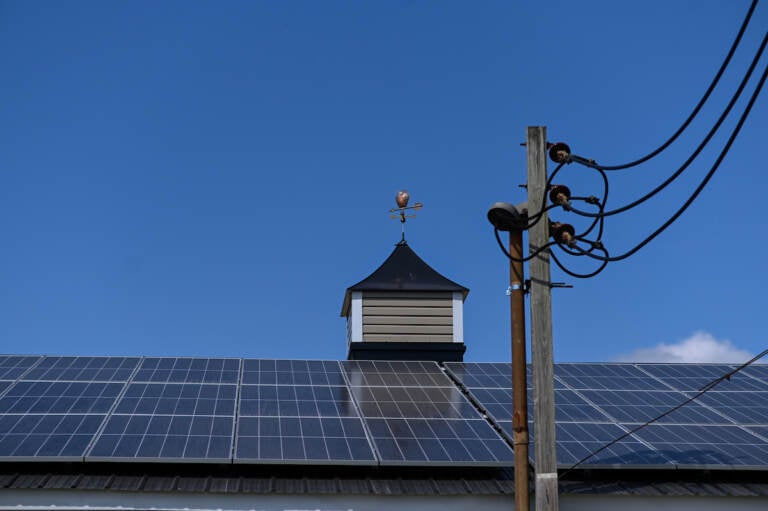
A solar array at Maple Lawn Farms in York County on Sept. 20, 2022. (Jeremy Long/WITF)
This story is part of the WHYY News Climate Desk, bringing you news and solutions for our changing region.
From the Poconos to the Jersey Shore to the mouth of the Delaware Bay, what do you want to know about climate change? What would you like us to cover? Get in touch.
Dozens of schools in Pennsylvania seem to be sticking with plans to install solar panels on their roofs, despite the rollback of federal clean energy tax credits in President Donald Trump’s signature budget bill.
The “One Big Beautiful Bill” Trump signed in July ends several energy tax credits early, including one that many schools plan to use to slash the cost of solar installations under Pennsylvania’s new Solar for Schools program.
None of the schools that received grants through Solar for Schools have informed the state they are pulling out of the program due to the federal rollbacks, said Penny Ickes, spokesperson for Pennsylvania’s Department of Community and Economic Development. One district in Berks County returned grant funds to the state, but did not specify why, Ickes said.
“While things are ever-evolving in D.C., it is our understanding that the schools … will be able to access those federal tax credits and be able to save even more money,” said Pennsylvania state Rep. Elizabeth Fiedler, who sponsored the Solar for Schools legislation.
Pennsylvania’s Solar for Schools program awarded its first round of grant funding to 74 schools this spring. The program helps districts pay for the up-front costs of solar installations that will lower their utility bills in the long term.
Districts were expected to use the state money to take advantage of a federal solar tax credit, which became available to schools for the first time through former President Joe Biden’s climate law.
Fiedler’s office had said that by combining the state grants with the federal tax credit, schools could install solar arrays for free or a fraction of the usual cost.
Rooftop solar tax credits to expire with enough time for schools to install panels
Despite fears that Congress would pass a bill that would have killed the tax credits before the end of the year, a version of the tax bill that ultimately became law gives districts until next summer to start building their projects or start running them by the end of 2027, to still claim the credit.
“That’s not a rush,” said Micah Gold-Markel, founder of Philly-based solar energy installer Solar States. “We can get solar projects started in as little as two weeks. So, to start construction in a year and finish it in two years, that’s easily doable.”
The School District of Philadelphia is still pursuing its Solar for Schools projects, said spokesperson Christina Clark. The district plans to install solar panels at W.B. Saul High School, Northeast Community Propel Academy, Andrew Hamilton Elementary School and Murrell Dobbins CTE High School.
Some districts struggle to afford necessary upgrades
The Upper Darby School District received roughly $2 million from Solar for Schools to install solar on the roofs of six schools. District officials told WHYY in June they would also need the federal tax credit in order to afford the projects.
The new tax credit deadlines are doable for the district, but would likely mean starting work on buildings before students go home for the summer, Marvin Lee, Upper Darby’s director of operations, told school board members last month.
The bigger challenge would be paying to replace the buildings’ roofs, which would need to be done before solar panels could be installed, officials said. The state grant, federal tax credit and a rebate from PECO would reduce the costs of the solar arrays to under $1 million, with a payback period of just three years. But replacing the roofs could cost over $4 million and take much longer to pay off.
“It sounds really good until we talk about the roofing costs,” Lee said.
Upper Darby School Board members voted to advise the district administration not to pursue the solar projects.
A new report finds big potential for solar on Pa. schools
A report released by the nonprofit PennEnvironment Wednesday found that if all roughly 5,000 of Pennsylvania’s schools installed solar panels, they could produce enough electricity to power around 187,000 homes per year, reduce planet-warming carbon emissions by as much as taking 300,000 cars off of roads and save schools more than $300 million over the lifetime of the solar energy systems.
In reality, fewer than half of the schools in the state would likely be capable of hosting solar on their rooftops, and even fewer would be able to install solar without first upgrading their roofs or electrical systems, Gold-Markel said.
PennEnvironment recommended policy changes that could make it easier for schools to actually install solar, including grants that cover roofing and electrical system upgrades.
“It’s clear that going solar is good for the environment, schools and students, and taking full advantage of Pennsylvania’s solar school potential requires supportive policies at every level of government,” said Flora Cardoni, deputy director of PennEnvironment.
Fiedler wants to see a second round of Solar for Schools funding included in the overdue state budget. She said even after the federal tax credit expires, the program will still benefit schools.
“Everyone who pays an energy bill is aware that energy prices are going up,” Fiedler said. “So everyone is trying to save money where they can, and the sun that’s up there waiting for us to harness its energy is a pretty good place.”
“There is huge demand for this program,” she added. “We believe that that’s going to continue.”

Get daily updates from WHYY News!
WHYY is your source for fact-based, in-depth journalism and information. As a nonprofit organization, we rely on financial support from readers like you. Please give today.



